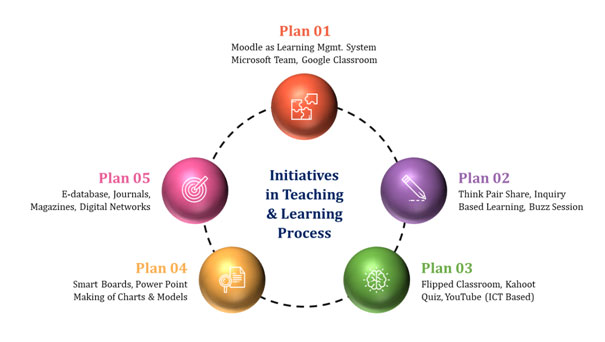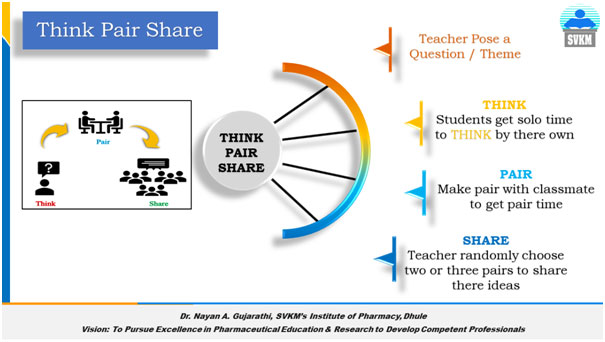School of Pharmacy & Technology Management, Dhule (SPTM)
(Formerly, SVKM's Institute of Pharmacy, Dhule). Approved by PCI, AICTE, DTE. Accredited in 1st cycle with A+ Grade (CGPA 3.43) by NAAC | Accredited by NBA (Diploma Program)

SVKM's Institute of Pharmacy, Dhule is committed for providing quality education to its students and continuously improving its academic and administrative processes. To achieve this, the institute has established an Internal Quality Assurance Cell (IQAC) in 2019 that monitors and evaluates the quality of education and services provided by the institute.
The IQAC of SVKM IOP is a facilitative and participative body that aims to promote a culture of quality assurance in the institute. The cell comprises a team of experienced faculty members and administrative staff who work together to ensure that the institute's quality standards are met.
The primary functions of the IQAC of SVKM IOP include:
The IQAC is an essential component in ensuring that the institute adheres to quality standards and provides a conducive learning environment for its students. The cell has played a significant role in the institute's accreditation process and has helped the institute achieve various quality benchmarks.
Some of the objectives of IQAC are:
The IQAC is a mechanism to ensure quality enhancement and sustenance in higher education institutions. The IQAC guidelines for our institute is based on standards set by NAAC includes following key points:
The composition of an IQAC committee of SVKM's IOP Dhule includes the following members:
| SN | Name of the Member | Designation | Role |
|---|---|---|---|
| 1 | Dr. Sameer Goyal | Principal | Chairperson |
| 2 | Mr. Santosh Agarwal | Member LMC | Industrialist |
| 3 | Mr. Ajay Agrawal | Member LMC | Local Society representative |
| 4 | Dr. Nilesh Salunke | Member LMC | Management representative |
| 5 | Mr. Jitendra Patil | Assistant (Admin) | Senior Administrative Officer |
| 6 | Dr. Raghu Prasad | Professor | Teacher |
| 7 | Dr. Yogeeta Goyal | Professor | Teacher |
| 8 | Dr. Kartik Nakhate | Professor | Teacher |
| 9 | Dr. Usman Siddique | Associate Professor | Teacher |
| 10 | Dr. Kumar Pratyush | Assistant Professor | Teacher |
| 11 | Dr. Pradip Bawane | Assistant Professor | Teacher |
| 12 | Mr. Himanshu Girase | Alumni | Member |
| 13 | Mr. Pranay Patil | Student representative | Member |
| 14 | Dr. Nayan Gujrathi | Professor | IQAC Coordinator |
(Ref: Guidelines for the Creation of the IQAC for Affiliated/Constituent Colleges (Updated Version As On April, 2022 Published by National Assessment and Accreditation Council, Bengaluru)
The Minutes of Meetings for each academic year are given below:
| Sr. No. | Academic Year | Document |
|---|---|---|
| 1 | 2022-2023 | View |
| 2 | 2021-2022 | View |
| 3 | 2020-2021 | View |
| 4 | 2019-2020 | View |
1. E-Learning Management System
SVKM's Institute of Pharmacy, Dhule adopted Moodle as a Learning Management System (LMS). Moodle was designed to provide educators, administrators, and learners with an open, robust and secure platform to create and deliver learning material. Moodle also facilitates the import features for use with other specific systems, such as importing quizzes or entire courses.
http://10.140.9.10/moodleIOP/?redirect=0

2. Flipped Classroom Activity
Flipped learning is a pedagogical approach in which the conventional concept of classroom- based learning is inverted. Students are introduced to the learning material before class commences. The classroom time is then used to extend the understanding of the topic through various activities like discussion with teacher and peers, problem-solving activities in a workshop situation facilitated by teachers.

3. Think Pair Share
Think-Pair-Share aids students in developing a conceptual understanding of a topic, fostering the ability to filter information and draw conclusions, and nurture the ability to consider the additional point of view by fruitful discussion.
In Think-Pair-Share the teacher asks a question to the whole class, as he or she would do at the beginning or at some point of the lesson. Students get some solo time to think about a possible answer- or to write it down- then they turn to their classmate sitting next to them and get some pair-time to share and discuss what they have just found out. At the end of this activity, the teacher randomly chooses two or three pairs and asks them to briefly share their answers or responses.
Pairs will most of the time succeed where single students would have probably failed.
Being the simplest and most famous cooperative learning strategy, the faculty of SVKM's Institute of
Pharmacy implemented Think Pair Share activity for the students.

4. Inquiry-based Learning
In this strategy, the class is divided into a group of 10 students. An individual topic/question/objective is assigned to each group. Each individual group is then asked to explore the topic by utilizing various online and offline resources such as the internet, reference books, official books from the library, official guidelines, etc. and give the best possible solution for the inquired topic. Finally, the students prepare a short presentation (4-5 slides) and presented in front of the class.

5. Other Initiatives
a. Seed Grant for faculty members
Seed money grant will be available to the faculty to expand the research activities in new avenues and emerging segments for establishing suitability of an idea for research. It provides the financial support for pilot scale validation of the project and to motivate faculty members to take up research on priority basis. Seed money of up to Rs. 1 lakh may be sanctioned to the faculty after receipt of proposal.
b. Add on Certificate Program
Add on / Certificate Programs for students are introduced to provide additional learner's centric skill oriented technical training that improves the professional and employability skill of the students.
c. Local Guardian System
Local Guardian System is successfully implemented to support the professional advancement of the students by relaying experiences and knowledge of mentors in the key performance areas of teaching, research and support service.
d. Slow Learners Management System
The aim of the remedial teaching is to provide the learning support to the students who lag far behind their counterparts in performance.
e. Expert talk for students and faculties
IQAC Organize Workshops/Seminars/Conference to help the institution reach the quality benchmark as given by NAAC.